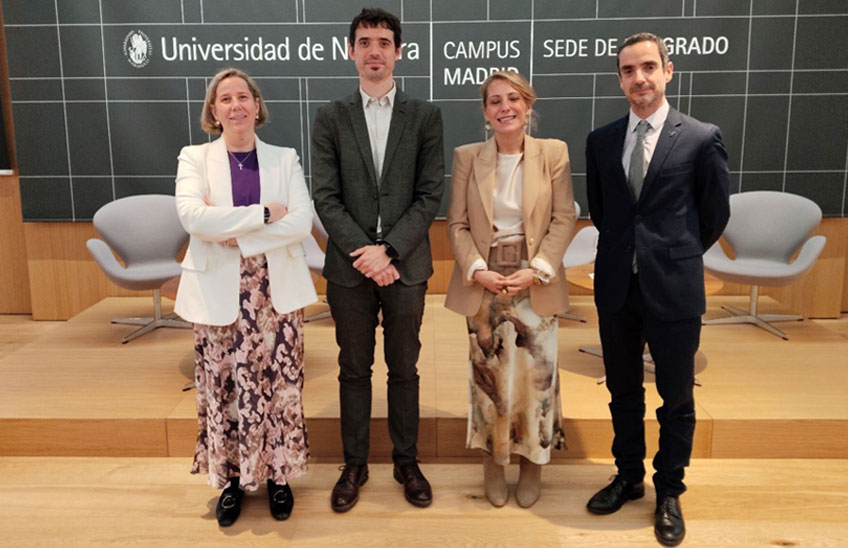"Startups that combine scientific and business professionals get up to 1.7 times more average investment each year"
The School of Pharmacy and Nutrition presented in Madrid the Expert Diploma in Planning and Financing of Pharma-Biotech Startups, which seeks to strengthen the development of emerging companies and enhance their business models.

10 | 02 | 2025
The School of Pharmacy and Nutrition of the University of Navarra, in partnership with AseBio, organized at its headquarters in Madrid the roundtable entitled "Barriers to innovation: challenges of start-ups in the Pharma-Biotech sector". The event served as a framework for the presentation of the ExpertDiploma in Planning and Financing of Pharma-Biotech Startups, whose goal is to strengthen the development of these emerging companies and enhance their business models.
The discussion, moderated by Esperanza Regueras, director of the program, included the participation of Ion Arocena, general director of AseBio; Elena Rivas, CEO of Arrays for Cell Nanodevices; and Santiago Lozano, director of core topic Capital funds. Together they analyzed the main challenges faced by startups in this highly competitive sector.
Pharmaceutical and biotech startups play a crucial role in innovation in the sector, generating 56% of new drugs marketed in 2023, a figure that reached 70% in 2021. According to IQVIA data , 72% of products in late-stage development are in the hands of start-ups, which are responsible for two-thirds of the clinical trials underway. However, despite these positive indicators, 90% of these companies fail due to problems such as lack of market knowledge , the definition of a differentiated value proposal and the optimization of resources and processes, as well as difficulty in accessing financing.
Science, business and financing: the keys to success
Esperanza Regueras pointed out that "startups with teams that combine scientific and business professionals get up to 1.7 times more average investment each year". In addition, those financed by venture capital funds achieve 6.5 times more annual investment. In this line, Santiago Lozano stressed the need to integrate science with data analysis to generate profitable and sustainable products over time.
Lozano also pointed out that "one of the most frequent mistakes in startups is to focus exclusively on scientific innovation without considering the commercial strategy and market needs from the outset. Financial viability is as important as technological breakthrough".
Elena Rivas insisted on the importance of having a solid business plan: "Turning something intangible into something tangible requires a clear roadmap. In Spain we do very good science, but we don't know how to sell it. The lack of a financing plan is a core topic obstacle for many startups." That is why Rivas emphasized the need to take advantage of all available resources to access funding, especially in the early stages of the project.
Creation of a support ecosystem
Access to external financing is vital for the development of the biotech ecosystem, given that many biotech start-ups are SMEs and micro-SMEs with no products on the market, which limits their ability to generate revenues. In addition, they operate in highly regulated environments and require significant investments with long maturation periods.
In this regard, Elena Rivas pointed out that "European and Spanish investors prioritize the profitability of the project, but these business models do not generate income in the first five years. It is essential to build a solid ecosystem that understands the dynamics of the sector.
Talent as a driver of change
Another of the core topic of the discussion was the role of talent in the growth of the sector. Ion Arocena, based on AseBio's report "Professional profiles in the biotech sector", pointed out that there is a mismatch between academic training and business needs, which makes it difficult to attract specialized profiles. In addition, he highlighted the growing demand for soft skills by companies and highlighted the need to update the curricula and promote the partnership between academia and industry to ensure the development of a competitive and sustainable biotech sector.
